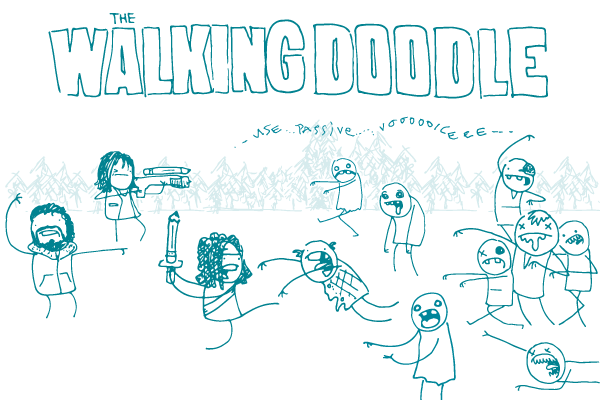
The AMC TV series The Walking Dead (in which people try to survive a zombie apocalypse) can certainly be a lesson in zombie preparedness. But did you know it can also teach us about writing for health literacy? Here are 10 lessons in plain language survival.
- Stick together. In a post-apocalyptic world, going it alone rarely works out. The same goes for developing original health content. Before you start, find out what else is out there, what works, and what doesn’t. This information can make a big difference, so fight the urge to go rogue.
- Get organized. Any group navigating a zombie hellscape knows that organization — Who’s leading? Who’s prepping meals? — is key. And in health communication, well-structured content is a necessity. Put the most important information first, and use bulleted lists, headers, and short sections to present information clearly.
- Know the difference between a walker and a biter. In other words, know your audience. What do they call walking corpses with an insatiable taste for human flesh? Lamebrains? Lurkers? Rotters? Be sure to use terms consistently and define them as needed — for example: “Learn to fight zombies (lamebrains).”
- Clear the area. Zombie survivalists know better than to get comfortable somewhere without first finding and killing any lurking zombies. What does this mean for you, dear readers? Cut out the fluff! Find and remove unnecessary details, jargon, and technical terms from your health materials.
- Bury your dead. Kill off clichés, that is. If you’re tempted to use a phrase like “think outside the box,” think again. Bury that cliché and replace it with something more straightforward. Do you mean, “be creative?” Write what you mean.
- Be aware of your surroundings. This is pretty obvious when zombies are around — and it’s just as important for writing effective content. What is your audience looking for? What challenges might they face? Remember, context is your friend.
- Don’t make noise. Zombies aren’t too smart, but they do know that where there’s noise, there’s food. You can pass the plain language test by being quiet. Use simple, transparent terms and only say what you need to. Complex language could bring an undead horde to your door — or, worse, confuse your readers!
- Be active. We’ve said it before, and we’ll say it again: active is better than passive. Any character who has made it through 7 seasons of The Walking Dead has done so by facing dangers head on. And in clear writing, the active voice is essential.
- Keep a lookout. Even when you find a safe place to wait out the apocalypse, don’t relax without putting someone on guard duty! No matter how carefully you craft your content, an editor is essential. Don’t skip the second set of eyes.
- Be human. After all, what’s the point of surviving in a world of zombies if you’ve lost all connection with people? Whenever possible, write how you speak.
The bottom line: Look no further than The Walking Dead for some excellent lessons for health communicators.
Browse recent posts